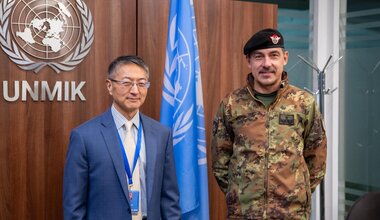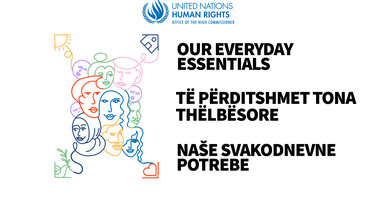24 Nov
2011
SRSG Farid Zarif Interview on Radio Dukagjini (Pristina)
Journalist: Mr. Zarif, you have visited the north, what is your impression? Will local Serbs accept integrated border management? It’s mentioned also in the Six Point Plan of Ban Ki-Moon, the integrated border management.
SRSG: My visits to the north were not for the purpose of discussing the concept of border management, that is under discussion in Brussels between representatives of Pristina and Belgrade. The purpose of my visit, as always in the north, was to call for calm and restraint on the part of the people and their leaders, to invite them to cooperate with UNMIK, EULEX and KFOR in the discharge of their responsibilities to have full freedom of movement for all in the area and to avoid the use of force and violence in the north. So, that was the purpose of my visit. I do not discuss these specific topics that are under the agenda of other international actors.
Journalist: But does UNMIK support the idea of the integrated border management?
SRCG: We support any solution, any agreement that commands the support of both Pristina and Belgrade.
Journalist: What is the UN stance on the barricades?
SRSG: This is an obstacle to the free movement of people and goods. We would like to see them removed as soon as possible. We understand on the other hand that this is the way the population in the north has expressed their disagreements with certain developments in the north. I believe that it would be possible through engagement to pave the way for the free movement of people and goods throughout the north. They are symbolic barriers, I’ve traveled to the north and know that you can still make your way around them but nevertheless theses need to be removed peacefully and as quickly as possible.
Journalist: Does KFOR have the right to remove the barricades?
SRSG: KFOR has a mandate to operate in the north, to provide a safe and secure environment for all residents of Kosovo. And in order to discharge their mandate they will have to have freedom of movement. Therefore the barricades are an obstacle to this. They can of course use kinetic means in order to remove them but so far they have not seen that as the best course of action because it could lead to casualties on the part of people who are on the barricades. They are making every effort in order to help the creation of an atmosphere whereby they can get these barricades to be removed by the people who put them up in the first place.
Journalist: UNMIK, KFOR and EULEX all operate under Resolution 1244. Today when three years have passed since independence, what is the coordination of these three missions?
SRSG: We talk to each other quite regularly. We would like to be in a position to assist with the discharge of the mandates of the other two international presences, however, each one operates under its own specific terms of reference and as far as UNMIK is concerned we do not interfere with that.
Journalist: Are you informed of every action that KFOR and EULEX takes?
SRSG: We do not need to know about those actions, some of those are operational, confidentialities and secrets of the respective organizations. In the same manner, there are certain things that we do not share outside of UNMIK. We respect their own space.
Journalist: Serbia will soon go into an election campaign. In your opinion can we expect a radicalization of the political scene in Serbia?
SRSG: That would be a judgment that should be outside my remit. But, I believe that there are lots of competing ideas that would have an impact on the outcome of elections; different political parties, different groups of population harbor different sets of priorities and those priorities would determine the way in which they will cast their votes.
Journalist: Based on your visit does Belgrade understand the reality since February 2008 here in Kosovo?
SRSG: In the course of my interactions with them, I see a lot of realism emerging. It is not possible for anyone to be ignorant of the developments of any nature and dimension. So, therefore, one would expect that there is a realization of the realities on the ground. To the extent that the politics of Serbia allow it, that realization has taken place.
Journalist: The meeting of the Security Council will soon be held. Where is Kosovo today on the agenda of the Security Council?
SRSG: This is one of the regular meetings of the Security Council. Kosovo will be participating in the Council. They will have an opportunity to express the views of the Pristina institutions there. They offer a perspective from the side of Kosovo to the international community which is borne in mind by the Members of the Council. The Council remains seized of the Kosovo issue and various members of the Council have also been making efforts on their own part in order to assist with the pacific resolution of the issue as soon as possible.
Journalist: Do you coordinate or at least exchange views with Kosovo and Serbia representatives before those meetings?
SRSG: I meet all of my interlocutors both here and in Belgrade. We do not coordinate our positions, because the United Nations' position is based on our own legislative mandate and the policy of the Secretary-General, but we usually call upon both to abstain from making harsh rhetorical statements against one another and to use the opportunity of Security Council meetings in order to take a step forward in the direction of finding a solution to the issue.
Journalist: Each and everyone calls on Resolution 1244. What is today the legal and political relevance of this resolution?
SRSG: You can look at it from both objective angle as well legal angle, not to say that both of them may match at times. But then, other than the Security Council Presidential statement of 26 November 2008, 1244 still remains the only and last consensus that the Security Council managed to forge on Kosovo. On the other hand, you have a lot of developments in Kosovo that have gone beyond the realities of the time when 1244 was adopted by the Council. There is increasing voice expressed in different parts of the world that the Security Council must make a deliberate effort in order to forge a new consensus that would also factor in the newly emerged realities and facts on the ground.
Journalist: The Serbia Government has the Ministry for Kosovo. Is this Ministry in accordance with the Resolution 1244?
SRSG: The fact of having a Ministry for any part of the world, including Kosovo, is not illegal. You have such Ministries in Cabinets of some important key countries in charge of Africa. For instance the UK government has a Minister for Africa. That does not mean that it is with the intention of considering Africa as a territory that belongs to the UK. In the context of Serbia it is a different situation. As you know, they repeatedly indicate the Constitution of Serbia, where Kosovo is considered as the southern province , and for that reason they maintain that Ministry. However, from the perspective of Resolution 1244 such an interpretation of the Ministry of Kosovo and Metohija is outside 1244.
Journalist: For how long do you think that Kosovo needs UNMIK?
SRSG: You know, any United Nations peacekeeping mission will have to come to an end and the sooner the better. It is often the fulfillment of the mandate of the mission that brings it to an end. Sometimes the mission becomes irrelevant. In the context of Kosovo, I think both may have a little bit of reality. Part of our mandate has already been accomplished. Quite a few other parts have become irrelevant. Yet, there are still a few things that UNMIK can continue to discharge. But withdrawal of the mission is not a decision that rests with the Secretary-General. The Security Council will have to take that decision. In the meantime we will try to make ourselves as useful as possible for the purpose of maintaining stability and peace on the ground and helping the parties' in their search for a solution.
Journalist: Hypothetically, could UNMIK turn into the UN regional centre for the Balkans?
SRSG: That's again, is not a decision that neither I nor the Secretary General would make. That depends on how the Security Council would want to see the future of UNMIK. It could be ultimately withdrawn completely or it could have a different mandate that could give it a sort of regional perspective and responsibility, but that is something that only members of the Security Council can decide.
Journalist: Okay, my last question, can we go b ack to the first question of my interview. When you heard from the Serbia side that it was their idea- the integrated border management between Serbia and Kosovo and then Prime Minister Thaci that it was Kosovo’s idea, the integrated border management, were you smiling in regards to this since Ban Ki-Moon’s Six Point Plan that for customs to be under integrated border management between Kosovo and Serbia?
SRSG: I’ll tell you something, often times it doesn’t matter whose idea it is as long as it is an idea that takes us beyond where we are today, that paves the way for greater mutual trust and confidence, that creates grounds for future understanding on the remaining issues. So, whoever takes credit for it, I should say that they are courageous people , people who have vision , and who would like to see that there is a positive contribution in the direction towards the future.
Journalist: But people from Kosovo told us that the Six Point Plan was unacceptable and then after three years they say it is a European idea.
SRSG: Well, you know that changing one’s mind is not a crime. There are lots of things that you don’t agree with...and later on you agree. Conversely, there are lots of things that you would agree to today but in light of changed realities and emergence of new factors you would change your opinion and would disagree with it. I don’t think that you should hold the Kosovars now responsible for changing their mind. I think if that’s a new realization, it should be welcomed.
Journalist: Thank you very much for this interview.
SRSG: It’s my pleasure.
 UN
UN United Nations Peacekeeping
United Nations Peacekeeping





